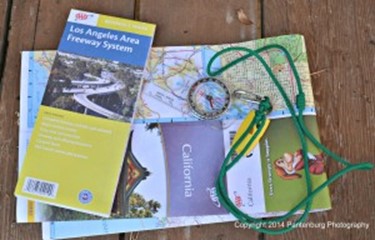So how valuable are the wilderness survival skills in an urban disaster environment? Very. Here are some you need to know.
A friend had set up a bugout bag for his my daughter. She started college near Los Angeles, and he was always paranoid about the potential for a major earthquake in that area.

Among critical skills for urban survival is the ability to use a map and compass.
Then, in an instant, he went from being a paranoid dad to visionary, as a 6.0 earthquake was registered in Napa, CA. Extensive damage and he expected to run into some of the aftershocks later.
Great segue into this question from a reader: “What wilderness survival skills will work in an urban emergency situation.”
Well, a survival mindset is necessary for surviving anything. Studies have shown that 80 percent of people in any emergency won’t know what to do, and will need someone to lead them. Another 10 percent will do the wrong thing. And the ones who survive, the remaining 10 to 15 percent will survive because they relied on previous training.
So lets’ say an earthquake (or fill in your particular disaster) has occurred. You have to evacuate a building, and end up in a parking lot with a lot of other people. The weather is nasty, and the temperature is dropping. There is no help in the foreseeable future. What skills do you need?
Here are five wilderness survival skills that could help you survive this urban emergency.
Shelter: The first decision might be to get out of the elements. Do you know how to tie effective knots? Can you make a shelter out of the available materials?
It could be the best place to find shelter materials is in the nearby dumpster. Look for anything that can insulate you from the elements: plastic sheeting, newspapers, cardboard etc.
Check out the trash can – if it has a 55-gallon liner, you can make a quick shelter out of it.
Water: Any water you might find should be suspect, unless it is bottled or otherwise sealed from contamination.
Fire: You should know how to build a campfire using whatever flammable materials that might be available. Many of the people in the parking lot might need a place to get warm, and light as it gets dark will be really appreciated. Also, boiling water is usually the quickest way to purify it. Make sure to get any containers from the dumpster – you may need them later.
https://www.youtube.com/playlist?list=PLTxZw4f6nzSH2IAsw2A70K7lHkUM5UOZg
Obviously, if you smell gas or the situation seems dangerous, don’t play with fire!
Navigation: If you have to leave the area because staying would be dangerous, do you know where to go, and which way to take to get there? Can you read a city street map and use a compass? During a storm, or in the darkness, you may not be able to determine directions. Be able to orient a map and know how to read it.
First aid: Everybody should take a basic first aid class. You don’t have to reach EMT expertise, but a rudimentary knowledge is important. After any sort of disaster, somebody will be hurt, and you may be the only one available to help. This is not the time to look around frantically and wonder what to do.
Obviously, there are a lot of other skills that you should know or learn. If you practice and prepare for an earthquake, for example, that means you’re pretty well set for other disasters. You can’t prepare for every eventuality, but you can come close!
Start now to make sure you are staying prepared.
Via: survivalcommonsense




 Follow
Follow
Leave a Reply